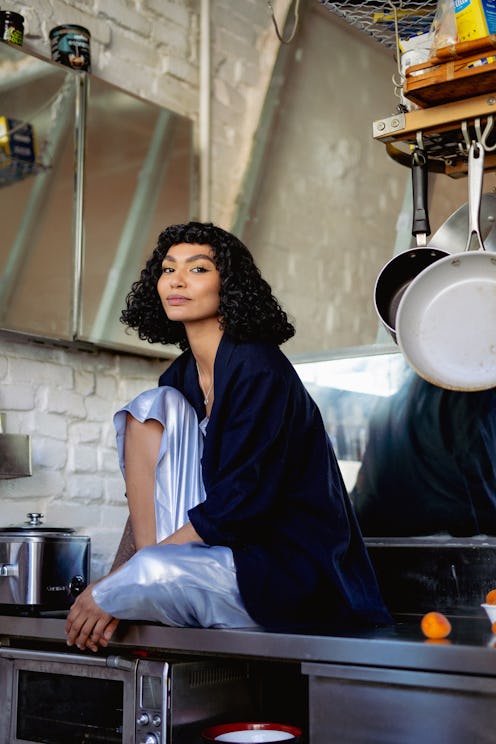(Inspiration)
Sophia Roe Is Changing How We Talk About Food
The chef and advocate discusses her journey to industry success.

Sophia Roe has proven time and time again that she is an individual of many accomplishments. From receiving the James Beard Foundation’s “Emerging Voices Award,” to serving as the face and host of her hit TV show, Counter Space, to being the first Black woman chef to receive an Emmy nomination in the culinary category, the 33-year-old arbiter of food has quite literally manifested the life of her dreams.
From an early age, Roe always knew that she was destined for greatness despite enduring a troubled upbringing. Born and raised in Florida during the late ‘90s, her journey to success started in homeless shelters, where Roe and her mother often slept on cots. She recalls frequently experiencing hunger firsthand throughout her childhood, and credits this as one of the driving factors that led her to advocate for accessible food education to marginalized communities around the world.
“No one should ever have to know what being hungry looks like,” she says to TZR. “I had a really hard upbringing you know, both of my parents were substance abusers and I just always had this crazy ambition to work because I was so terrified that I would have nothing forever. I grew up sleeping on cots in random shelters when my mom and I didn't have a place to stay, and I’m not really sure why, but food just always felt like my calling.”
And while childhood should be a time of play and carefree living, Roe’s centered on learning to take care of herself. “I cannot tell you enough how much I didn't have fun in my life,” she says. “I didn't have fun, I didn't have a good time. People have these memories of going out with their friends and experiencing life fully at an early age. Well, I’ll be the first to tell you that, I didn't have any of that. I just remember that all of my childhood was me hustling.”
As tough as that truth may be, said hustling powered Roe’s culinary journey and success. The Florida native recalls an early fascination with cooking, watching Great Chefs of the World on PBS as a child. “I was obsessed with food and thought it was the coolest thing in the world. I used to ride my bike and go to the library and I remember grabbing all of the food books I could find,” she says. “There was a Vietnamese restaurant that was hiring at the time and they eventually hired me to work for them when I was 19. That was pretty much the beginning of everything. I’ve worked in so many types of restaurants and places for the past 14 years.”
Roe’s hard work and vast culinary knowledge eventually extended to the digital world. Her rapidly growing Instagram and YouTube communities led to the creation of Counter Space, a VICE TV program that Roe both produces and hosts, which aims to democratize the food industry by not only educating viewers on cooking, but also food systems and politics that affect the world at large. It fearlessly addresses (and dismantles) tropes and stereotypes that often inhibit communities of color, serving as a vehicle to investigate why these tropes even exist and spotlight the underrepresented communities that face a plethora of food disparities.
“The show is so meaningful because it’s not a show about me, it’s me having a show about other people, and all of the people of color out there that need to be recognized on a global scale,” she tells TZR. “Broadcast media within the food industry doesn't talk to people who don't have access to refrigeration. They don't talk to people living in food deserts, or people who don't have the resources they need to buy healthy foods. Food can't just be for one demographic or one specific group of people. We’ve gotta make it accessible to all people.”
Roe’s vision and hard work has clearly resonated with her audience and peers, leading her to receive the James Beard Foundation Award for “Emerging Voices” for her work on Counter Space. The show has also received two Daytime Emmy nominations. The chef’s journey serves as a much-needed inspiration and encouragement, but to be clear, with such esteem comes pressure. “I don't ever want to be the first Black woman to be nominated for anything ever again, I think that it’s such a lonely place to be in,” she says. “It can really be a hard truth to swallow at times, even though the work is necessary.”
In Roe’s mind, she’s simply a “story steward,” called to encourage important conversations that the world should be having. “There’s a historical reason why Black people have always been associated with fried chicken,” she says passionately. “I want people to really investigate why there are certain tropes about us and food. I really want us to change that.”
By using food as “a lens to explore our changing world,” Roe has and is currently shifting the scope of conventional cooking. Her position as a leading face on and off screen has become a guiding light for women, particularly young Black women, who may have never dreamed of seeing themselves on TV, let alone in a high seated position of industry success.
“If all kinds of white folks can dominate an industry like food, I don’t see why different types of Black folks can’t dominate it,” says Roe. “There’s plenty of space for everybody, and I just really want to somehow further hope for Black women, they need something to hope for so bad.”